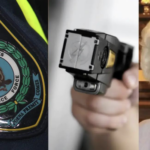Would You Rather Be Suspected of a Crime in the US or Australia?

American ‘true crime’ shows often tell stories of defendants getting-off serious criminal charges due to problems with the evidence, or legal ‘loopholes’, or last-minute ‘breakthroughs’ by cunning criminal defence lawyers.
Most people are aware that these TV shows aren’t an accurate representation of the US criminal justice system, and are even less reflective of Australia.
But what if you were a suspect, would you rather go through the US or Australian criminal justice system?
Before you answer that question, let’s compare the rights, safeguards and protections afforded by each system to those suspected of crimes.
Police Powers of Arrest
Police in the US must establish ‘probable cause’ before searching, arresting or charging a person with a criminal offence. This principle is embodied in the Fourth Amendment to the US Constitution, which reads:
‘The right of the people to be secure in their persons, houses, papers, and effects, against unreasonable searches and seizures, shall not be violated, and no Warrants shall issue, but upon probable cause, supported by Oath or affirmation, and particularly describing the place to be searched, and the persons or things to be seized.’
The relevant test was outlined in the case of Brinegar v. United States (1949), where the court held that a ‘probable cause’ is ‘a reasonable amount of suspicion, supported by circumstances sufficiently strong to justify a prudent and cautious person’s believe that certain facts are probably true.’
In contrast, police in Australia only need to show a ‘reasonable suspicion’ to perform a lawful arrest or search – which is a much lower test than a ‘probable cause.’
Not only is the test much less onerous, but the scope of a lawful of arrest in NSW has been greatly broadened in recent years – allowing police to arrest people for a very wide variety of reasons, including:
- To ensure the appearance of the person before a court,
- To prevent a continuation of the offence or the commission of another offence,
- To prevent interference with evidence,
- To prevent the fabrication of evidence,
- To preserve safety or welfare of any person; not just witnesses and including the defendant,
- To stop the person fleeing,
- To obtain property in possession of the person in connection with the offence,
- Because of the nature or seriousness of the offence.
So while the US takes an ‘ask questions then shoot’ approach, Australian police enjoy the ability to ‘shoot first and ask questions later’. In fact, it is not uncommon in Australia for people to be arrested, charged and refused bail on very little evidence.
The Right to Silence
The United States has a firm right to silence, which is protected by the Fifth Amendment to the Constitution:
‘No person shall be held to answer for a capital, or otherwise infamous crime, unless on a presentment or indictment of a Grand Jury…nor shall any person be subject for the same offence to be twice put in jeopardy of life or limb; nor shall be compelled in any criminal case to be a witness against himself, nor be deprived of life, liberty, or property, without due process of law; nor shall private property be taken for public use, without just compensation.’
This means that defendants can ‘plead the fifth’ and refuse to answer questions which may tend to incriminate them.
Although NSW used to have a right to silence in respect of police questioning, that ‘right’ was significantly diluted in 2013 when then Premier Barry-O’Farrell added section 89A to the Evidence Act.
That section allows an ‘unfavourable inference’ to be drawn from a defendant’s failure or refusal to answer questions asked by police in serious criminal cases. In other words, maintaining a right to silence – even when a person is innocent – can now harm a defendant’s case. Police have recently pushed for a further dilution of the right to silence, arguing that they should be able to caution a person without them having a lawyer present.
And unlike in the US, defendants in Australia must answer questions asked of them in court – although they can ask for a ‘certificate’ so that answers which incriminate them for other offences (not the one before the court) cannot be used at a later time.
Regardless of ‘certificates’, forcing defendants to answer questions which incriminate them in other offences can effectively ‘tip-off’ police, who may then commence investigations into that further alleged offence and seek to gather the evidence from another source.
Presumption of Innocence
Those in the United States are guaranteed the right not to be convicted of a criminal offence unless the prosecution proves guilt ‘beyond reasonable doubt’. This applies to all criminal offences.
In Australia, this presumption has recently been ‘reversed’ for several offences – including ‘goods in custody’, where the defendant must prove that any goods ‘reasonably suspected of being unlawfully obtained’ were legitimately derived – something that may be difficult to do without receipts or other evidence.
Bail
America is known as the land of freedom – and indeed defendants in the United States find it relatively easy to achieve a grant of bail, except in extreme cases. There are even ‘bail bondsmen’ who can provide bail money to those with limited funds, for a fee.
In stark contrast, bail has become increasingly difficult to achieve in NSW – particularly since the passage of the amendments to the new Bail Act.
In fact, people charged with certain offences are now required to ‘show cause’ as to why their detention is not justified, even if they are able to prove that they are not an ‘unacceptable risk’ to the community.
These changes mean that defendants are increasingly being held on remand (in prison) while they await court – which has seen prisons around the state struggle to accommodate the growing number of inmates.
Many of those being held behind bars are innocent, and ultimately have their charges withdrawn or thrown out of court – but not before being imprisoned for months or even years.
These people are highly unlikely to be compensated in any way.
The Right to Legal Representation
The Sixth Amendment to the US Constitution reads:
‘In all criminal prosecutions, the accused shall enjoy the right…to have the Assistance of Counsel for his defence.’
This means that all defendants in the US must be given a free lawyer if they cannot afford one.
In Australia, defendants hoping to get Legal Aid must satisfy a means test (based on income and assets), as well as a merit test (based on whether it is reasonable in the circumstances to grant Legal Aid).
This means that large numbers of Australians fall within the ‘justice gap’ – where they cannot afford a private lawyer but are ineligible for Legal Aid. It is a situation which results in thousands of defendants fending for themselves (unrepresented) in courts across Australia every year – regularly pitted against an experienced and well-resourced prosecution.
Illegal Evidence
Again, the US Constitution prioritises the rights of the defendant over the power of the state – the Fourth Amendment containing the ‘exclusionary rule,’ which means that the vast majority of illegally obtained evidence is inadmissible in court.
By contrast, the chances of excluding illegally obtained evidence in Australia are far slimmer – especially when it comes to serious charges.
Illegally obtained evidence is admissible in Australia as long as the prosecution is able to establish that the desirability of admitting the evidence outweighs the undesirability of admitting evidence derived in that (illegal) manner.
Appeals
Both countries have an appeals system – but wrongly convicted people in the US have arguably more chances of a wrongful convictions being identified and overturned; both having ‘more bites of the cherry’ in courts, and through projects aimed at identifying and overturning wrongful convictions.
The Innocence Project which operates throughout the United States has already seen over 300 people exonerated. Funding for the Australian Innocence Project was withdrawn by the Howard government, and the current project is extremely limited.
Furthermore, wrongly convicted defendants in the US are often entitled to compensation through statutory schemes, whereas Australian defendants are not, and are highly unlikely to be awarded any form of damages even if they are proven to be innocent.
Penalties
Many argue that penalties in the US are much more severe – some states still impose the death penalty, and ‘three strikes’ laws require courts to impose tough mandatory sentences on persons convicted of three ‘felonies’.
However, Australia is fast moving in the same direction as the US, with the government introducing a suite of tough mandatory sentencing laws in recent years – despite studies showing that they fail to reduce crime rates.
And there’s more…
There are many other concerning aspects of the Australian ‘justice’ system which are not shared by the United States, including but certainly not limited to:
– ‘mandatory defence disclosures‘ which now require defendants in NSW to reveal the nature of their defence to the prosecution in the lead-up to trial,
– the erosion of privacy, and the danger of selected internet data being used out of context to build a case against a person, thanks to unprecedented ‘meta data retention laws’. Those laws require internet service providers to hold personal data for two years, and allow a suite of law enforcement agencies to access that data without a warrant,
– police and other law enforcement agents being given immunity from both civil and criminal prosecution for anti-terrorism raids, even if those raids are unjustified and the agents commit heinous crimes against innocent people, and
– the removal of the the right against detention without charge through instruments such as ‘control orders’ and ‘preventative detention orders’.
So which country would you prefer to be suspected of a crime in?






